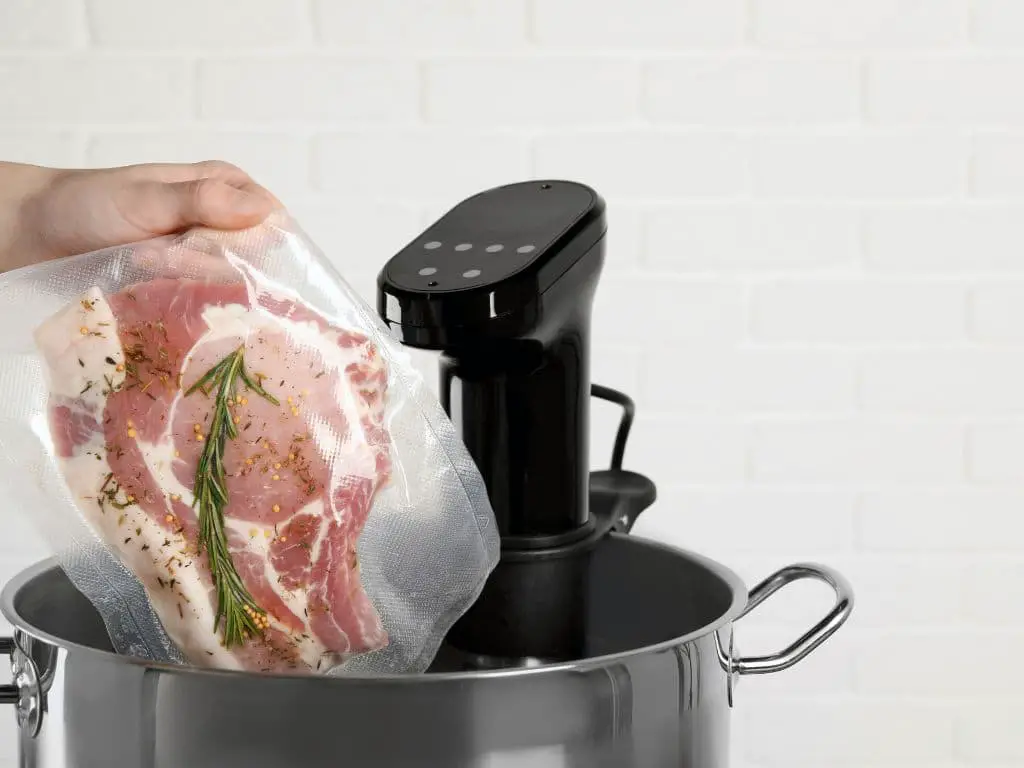Sous vide is a unique cooking method that involves vacuum sealing food in plastic bags, then immersing them in a temperature-controlled water bath. The food cooks slowly and evenly in the precisely-controlled environment. While sous vide was once limited to professional kitchens, it has become more accessible in recent years thanks to affordable immersion circulators. These devices allow home cooks to transform pots into sous vide water baths.
Sous vide allows for unmatched precision when cooking. By maintaining an exact temperature, you can achieve the ideal texture and doneness. Foods cooked sous vide retain their natural flavor and nutrients. The bags also limit moisture loss during extended cooking.
While most sous vide recipes call for fresh or thawed ingredients, it’s also possible to cook frozen food with excellent results. Let’s look at the benefits and best practices for sous vide cooking frozen meat.

Sous Vide Products I Use Every Day
As an Amazon affiliate, I earn from qualifying purchases.
Last update on 2025-03-03 / Affiliate links / Images from Amazon Product Advertising API
Can You Sous Vide Frozen Meat?
You absolutely can sous vide cook frozen meat. In fact, it offers some advantages over thawing first. Sous vide’s gentle cooking environment helps ensure frozen meat comes out tender and juicy.
The key is adjusting the cooking time to account for the frozen state. Frozen foods require longer cook times to allow the heat to properly penetrate and tenderize. With the right time and temp, sous vide produces restaurant-quality meals from frozen.
Benefits of Sous Vide Cooking Frozen Meat
Sous vide offers several benefits when cooking frozen meat compared to thawing first:
1. Time-saving
Cooking frozen meat in the sous vide allows you to save time. There’s no waiting for meat to thaw beforehand. It also simplifies planning – you can sous vide cook meat straight from the freezer.
2. Consistent Results
The precision temperature control of sous vide results in very consistent cooking, even from frozen. You’ll get the exact doneness you want, with moisture retained and texture intact.
3. Retains Nutrients and Flavor
Cooking frozen meat sous vide retains more nutrients than high-heat cooking methods. The vacuumed sealed bags also prevent flavor from escaping.
4. Reduces Food Waste
Using frozen meat in sous vide reduces food waste. You can portion and freeze meats for future meals. Nothing gets freezer-burned or wasted.
How to Sous Vide Frozen Meat
Cooking frozen meat sous vide takes a few special considerations:
1. Adjust Cooking Time
- Frozen meat takes 50-100% longer to cook than fresh.
- For example, chicken breasts take 1-2 hours fresh but 2-4 hours frozen.
- Defrosting is not required, but extends cook times significantly.
2. Use Proper Vacuum Sealing Techniques
- Ensure frozen meat is sealed with no air pockets, which can lead to uneven cooking.
- Consider double bagging to prevent punctures from ice crystals.
- Apply minimal seasoning/marinades before sealing, as flavors concentrate.
3. Ensure Proper Water Circulation
- Arrange sealed frozen pouches carefully in the water bath to allow water to circulate effectively.
- The water must maintain consistent contact with the bags for proper heat transfer.
4. Monitor Water Temperature
- Water temperature drops when adding frozen foods.
- Make sure the bath regains proper temp before starting cook time.
- Never cook at lower temperatures to compensate.
5. Check for Doneness
- Use a thermometer to check meat doneness after cooking.
- Frozen meats often cook slower, so verify they have reached safe final temperatures.
- Continuing cooking if needed to ensure food safety.
Precautions When Sous Vide Cooking Frozen Meat
While cooking frozen meat sous vide can yield delicious results, there are a few precautions to note:
1. Avoid Overcooking
It’s easy to overdo it with the extended cook times. Take care not to go overboard and end up with mushy, dried out meat.
2. Ensure Proper Food Safety
Always cook frozen meat to pasteurization temperatures to eliminate pathogens before eating. Use a thermometer to verify doneness.
3. Be Mindful of Seasoning
Lightly season meats before sealing, as flavors concentrate over the long cook. You can add more after cooking if needed.
4. Avoid Sous Vide Cooking Large Cuts of Frozen Meat
Stick to smaller cuts like chicken breasts or steak. Larger roasts and whole birds do not heat evenly from frozen.
Conclusion: Sous Vide Cooking Frozen Meat for Convenience and Taste
Cooking frozen meat in a sous vide circulator offers a convenient shortcut to deliciously cooked dinners. The precision temperature control ensures optimal results every time. While cook times need adjusting, sous vide’s moist gentle heat tenderizes frozen meat into fork-tender recipes your family will love. Follow the guidelines above for perfect meat and meals straight from the freezer. Sous vide cooking makes meal prep and cooking easier than ever.


![IMPRESA [10 Pack] Sous Vide Magnet Weights for Keeping Bags Submerged – Sous Vide Accessories to Stop Floating Bags & Undercooking – Weighted Magnets for Containers](https://m.media-amazon.com/images/I/41zHpl8G2lL._SL160_.jpg)

